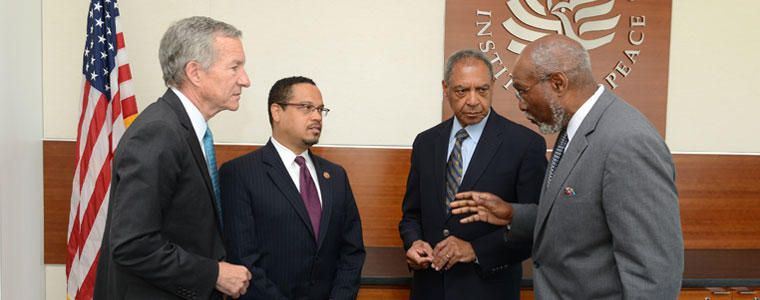Congressman Keith Ellison this month met with USIP President Jim Marshall, USIP Vice Chairman Ambassador George Moose, former Assistant Secretary of State for African Affairs Johnnie Carson, now a senior advisor at USIP, David Smock, senior vice president of USIP’s Centers of Innovation, and Jon Temin, director of USIP’s Horn of Africa program, to discuss the current situation in Somalia.

When most Americans think of Somalia, the first images usually are of the chaotic and nightmarish 1993 Battle of Mogadishu, commonly referred to as Black Hawk Down, in which Somali militia fighters shot down two UH-60 Black Hawk helicopters. Eighteen Americans were killed in the ensuing ground battle.
Nearly two decades later, Congressman Keith Ellison finds greater potential for U.S. relations with this country of nearly 11 million people.
Indeed, given Somalia’s geostrategic location and with more than 150,000 Somali-Americans living in the United States -- and one in three in Ellison’s 5th district in Minnesota -- it seems sensible that the United States would want to seek a productive relationship, and even an economic and security partnership, with Somalia.
Earlier this year, Ellison traveled to Somalia, marking the first congressional visit there since the late Congressman Donald Payne’s trip nearly four years ago.
In an op-ed in the Minneapolis StarTribune this April, Congressman Ellison wrote: “It’s a new day in Somalia…We have our best opportunity in more than two decades to help stabilize Somalia and advance U.S. national security interests — but only if we act quickly.”
“The improved security situation has filled Mogadishu with new life. Somalis can once again play music and dance, activities banned by terrorist group Al-Shabab, which until recently controlled much of the country. Crowds of people fill the streets, socializing and shopping.”
To discuss how to help Somalia continue its progress, Ellison on June 5 met with U.S. Institute of Peace President Jim Marshall, USIP Vice Chairman Ambassador George Moose, former Assistant Secretary of State for African Affairs Johnnie Carson, now a senior advisor at USIP, David Smock, senior vice president of USIP’s Centers of Innovation, and Jon Temin, director of USIP’s Horn of Africa program. They discussed how the Institute’s work, including its expertise in constitution-drafting process, could help the situation, as well as USIP’s grants to Somali nongovernmental organizations.
Ellison said he wanted to learn more about the peacebuilding aspect of U.S. foreign policy, especially since so much has traditionally revolved around defense and military strength. Ellison also said that his broader goal was for the U.S. Congress and the U.S. government to think about creating a new role in Somalia, and that it was “time to turn the page on the Black Hawk Down event. It is a volatile situation and now we have a window of opportunity to engage in a way to make a positive difference.”
It is “time to see Somalia in a new light – not as just a recipient of food aid, but as a potential trade partner and security partner,” Ellison said at the private USIP meeting.
Marshall noted that “before we can talk about trade and security partnerships, Somalia has a number of development needs that have to be met or the situation won’t get better. We at USIP can help countries going through such turmoil, and with post-conflict transitions, such as offering assistance with constitutions.”
USIP’s Horn of Africa specialist Jon Temin continued, “As the country is rethinking its provisional constitution, we can support a dialogue process on key constitutional issues. While this may seem like a very narrow slice of the political process, it’s extremely important. This is an opportunity to establish a legitimate foundation on which Somalis can build.”
Temin observed too that the country is struggling with questions concerning federalism and how it can be implemented, which could be addressed during a constitution-making process.
Smock and Temin noted the impressive grant applications from Somali civil society organizations that USIP received for its Horn of Africa grant competition.
Carson, having just served as assistant secretary of state, discussed some of the regional dynamics, such as Kenya’s strategic interests in Somalia.
Among other recommendations, Ellison discussed his interest in fostering sister city relationships between American and Somali cities.
Ellison recommended that the mayor of Mogadishu come to the U.S. to meet with American mayors, so that they can exchange professional experiences and lessons learned.
Having served as the mayor of Macon, Georgia from 1995-1999, Marshall recognized the value of local action and cultivating such relationships.
Ellison continued that he spoke to the Somali president every two months or so in order to maintain their connection.
After all, as Ellison wrote in his StarTribune op-ed: “What we do now may determine whether we face another 22 years of terrorism, piracy and famine in Somalia, or whether we help Somalia write the first chapter of its comeback.”